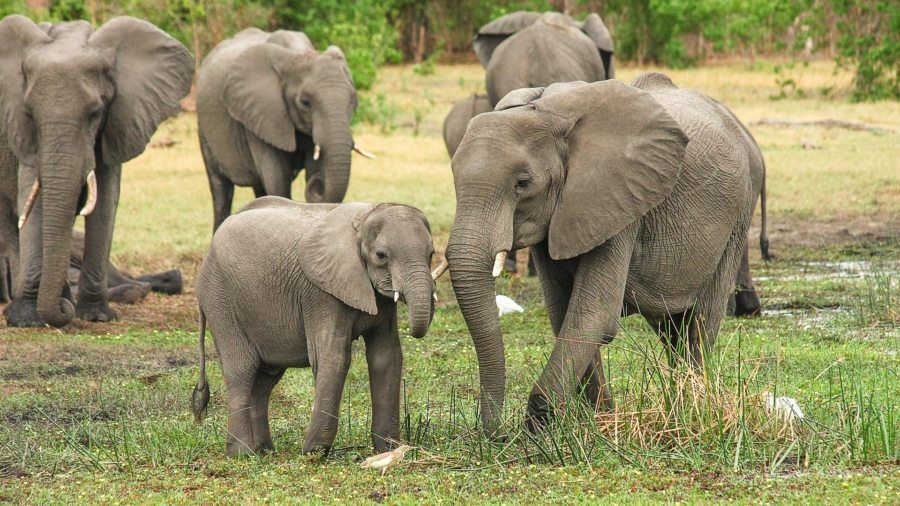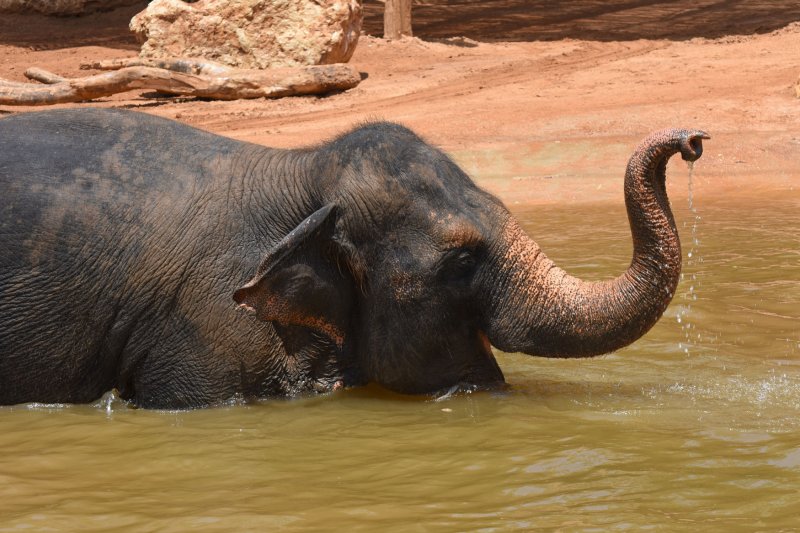AFRICA
Elephants Relocated to New Home in National Park Ahead of World Elephant Day Aug 13, 2022

Elephants in a file photo. (Michael Siebert/Pixabay)
There’s precious cargo onboard.
With a prod of encouragement, the elephant steps out into its new home, Kasungu National Park.
It’s in a bit of a bad mood after its long journey.
But after a warning charge at the humans gathered nearby, it walks off into the forest.
The animal is in the last batch of elephants to be relocated here from Liwonde National Park, 350 kilometers away.
Two hundred and sixty-three of them have been moved here since June 10 (2022).
The Liwonde site was overpopulated with elephants, causing conflict with local communities.
But Kasungu has plenty of room for these large mammals.
“Most of the time issues of human-elephant conflict come in when animals go outside the park looking for food or water. Kasungu has good water sources and it does good vegetation cover so the incidences of elephants going out is a bit controlled because they have food inside the park,” explains Petros Kachulu, Kasungu National Park Manager.
Kasungu lost its elephant population to poaching.
According to government figures, they dwindled from 1,200 in the 1970s to just 50 in 2015.
But security has been improved in recent years, so the authorities are confident the new arrivals will be safe here.
“The importance of good habitat is that you provide the necessary environment for them to multiply and it also helps to reduce the human-wildlife conflict because instead of going into the community looking for food they are able to stay in the park,” says Kachulu.
Not everyone is happy to welcome the elephants.
Some local people believe the park should have done more to protect the surrounding area before accepting the transfer.
They are worried the animals will encroach on their homes.
“It is saddening to note that elephants have expeditiously been brought here before the park fence was completed,” says Eliot Linyangwa, a local leader living within the Kasungu National Park.
“The arrival of the elephants will likely affect the works on the fence, which is not good. The operators of the park however have to utilise the computerised system that has come along with the elephants and control them from going outside the park.”
The relocation of elephants was carried out by the Department of Parks and Wildlife in Malawi, African Parks, and the International Fund for Animal Welfare (IFAW).
The International Union for Conservation of Nature lists the African Savannah Elephant as endangered as over 60 percent of their population is estimated to have been lost since 1965.
August 12 marks International Elephant Day.
There’s precious cargo onboard.
With a prod of encouragement, the elephant steps out into its new home, Kasungu National Park.
It’s in a bit of a bad mood after its long journey.
But after a warning charge at the humans gathered nearby, it walks off into the forest.
The animal is in the last batch of elephants to be relocated here from Liwonde National Park, 350 kilometers away.
Two hundred and sixty-three of them have been moved here since June 10 (2022).
The Liwonde site was overpopulated with elephants, causing conflict with local communities.
But Kasungu has plenty of room for these large mammals.
“Most of the time issues of human-elephant conflict come in when animals go outside the park looking for food or water. Kasungu has good water sources and it does good vegetation cover so the incidences of elephants going out is a bit controlled because they have food inside the park,” explains Petros Kachulu, Kasungu National Park Manager.
Kasungu lost its elephant population to poaching.
According to government figures, they dwindled from 1,200 in the 1970s to just 50 in 2015.
But security has been improved in recent years, so the authorities are confident the new arrivals will be safe here.
“The importance of good habitat is that you provide the necessary environment for them to multiply and it also helps to reduce the human-wildlife conflict because instead of going into the community looking for food they are able to stay in the park,” says Kachulu.
Not everyone is happy to welcome the elephants.
Some local people believe the park should have done more to protect the surrounding area before accepting the transfer.
They are worried the animals will encroach on their homes.
“It is saddening to note that elephants have expeditiously been brought here before the park fence was completed,” says Eliot Linyangwa, a local leader living within the Kasungu National Park.
“The arrival of the elephants will likely affect the works on the fence, which is not good. The operators of the park however have to utilise the computerised system that has come along with the elephants and control them from going outside the park.”
The relocation of elephants was carried out by the Department of Parks and Wildlife in Malawi, African Parks, and the International Fund for Animal Welfare (IFAW).
The International Union for Conservation of Nature lists the African Savannah Elephant as endangered as over 60 percent of their population is estimated to have been lost since 1965.
August 12 marks International Elephant Day.
World Elephant Day promotes protection of pachyderms

World Elephant Day was founded in 2012 by Canadian filmmaker

World Elephant Day was founded in 2012 by Canadian filmmaker
Patricia Sims and Thailand's Elephant Reintroduction Foundation.
File Photo by Debbie Hill/UPI | License Photo
Aug. 12 (UPI) -- World Elephant Day, marked annually on Aug. 12, was founded by filmmaker Patricia Sims and Thailand's Elephant Reintroduction Foundation to promote the protection of Asian and African elephants.
The first World Elephant Day was held Aug. 12, 2012, with its official founders listed as Canadian filmmaker Sims and the Elephant Reintroduction Foundation, which is dedicated to safely returning captive elephants to the wild.
The annual observance is now marked in partnership with more than 100 elephant conservation organizations worldwide.
The World Elephant Society was founded in 2015 as a public charity to support World Elephant Day campaigns and events. Sims serves as its president and executive director.
"World Elephant Day is a rallying call for people to support organizations that are working to stop the illegal poaching and trade of elephant ivory and other wildlife products, protect wild elephant habitat, and provide sanctuaries and alternative habitats for domestic elephants to live freely," Sims said on the holiday's website.
Aug. 12 (UPI) -- World Elephant Day, marked annually on Aug. 12, was founded by filmmaker Patricia Sims and Thailand's Elephant Reintroduction Foundation to promote the protection of Asian and African elephants.
The first World Elephant Day was held Aug. 12, 2012, with its official founders listed as Canadian filmmaker Sims and the Elephant Reintroduction Foundation, which is dedicated to safely returning captive elephants to the wild.
The annual observance is now marked in partnership with more than 100 elephant conservation organizations worldwide.
The World Elephant Society was founded in 2015 as a public charity to support World Elephant Day campaigns and events. Sims serves as its president and executive director.
"World Elephant Day is a rallying call for people to support organizations that are working to stop the illegal poaching and trade of elephant ivory and other wildlife products, protect wild elephant habitat, and provide sanctuaries and alternative habitats for domestic elephants to live freely," Sims said on the holiday's website.
No comments:
Post a Comment